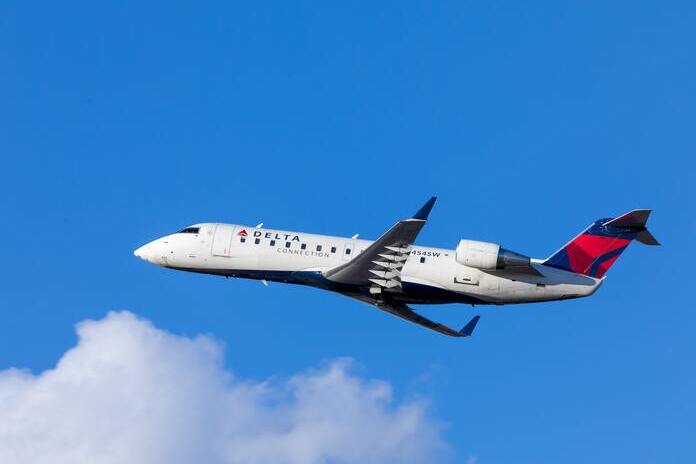Delta Stock (NYSE:DAL)
Earnings have been good for Delta Air Lines, which is one of the largest airlines in the world, and summer demand has been high. Delta Air Lines has been able to maintain a good performance because of its capable leadership and forward-thinking business strategy, despite the difficulties presented by the epidemic.
The COVID-19 Epidemic and its Repercussions for Delta Air Lines
The pandemic caused by the COVID-19 virus has had a substantial effect on the airline sector. As a result of restrictions and people’s fear of the virus, demand for air travel has decreased, which has made it difficult for many airlines to continue operating. Delta Air Lines, on the other hand, has been able to weather the storm better than most other companies because of its capacity to respond quickly and adapt.
During the course of the pandemic, Delta Air Lines took a number of precautions to protect both its customers and its personnel from the potentially deadly virus. These precautions include requiring everyone to wear masks, instituting stricter cleaning protocols, and isolating themselves socially. In addition, Delta Air Lines implemented a flexible booking policy, which enables passengers to make changes to their itineraries without incurring any additional fees.
Strong Earnings and Demand During the Summer
In its most recent financial reports, Delta Air Lines posted strong earnings, which surpassed the forecasts of financial analysts. The airline’s quarterly revenue reached $9.15 billion, which is a significant rise from the $1.47 billion it brought in during the same period the year before. As more people started to feel safe flying again, there was a stronger demand for air travel, which led to an increase in prices.
Demand for Delta Air Lines during the summer season has also been strong, and the carrier anticipates flying at 85 percent of its capacity prior to the pandemic by the time the summer is over. This occurs as a result of a number of variables, such as an increase in the number of people becoming vaccinated, a relaxation of travel restrictions, and a pent-up demand for travel.
Innovative Approaches to Achieving Success
During the pandemic, Delta Air Lines has put up a number of forward-thinking tactics, all of which have contributed to the company’s success. The utilization of predictive analytics is one of these tactics, and it is used to forecast demand in order to adapt flight schedules appropriately. Because of this, Delta Air Lines has been able to streamline its operations and cut its expenses.
In addition, Delta Air Lines has prioritized the enhancement of the passenger experience by strengthening its reward program and making investments in technological advancements. Despite the epidemic, the airline was able to maintain a devoted customer base with the support of its customer loyalty program, SkyMiles, which is one of the most popular in the industry.
Thursday saw a rise in the price of shares of Delta Air Lines after the airline carrier said that the prognosis for its second quarter was “strong.”
Delta (NYSE:DAL) climbed 3.2% in premarket trade. The company reported adjusted earnings of 25 cents per share in the first three months of the year, but the market anticipated earnings of 29 cents per share for the period. There was a total of $12.8 billion in revenue. Delta said that its adjusted revenue was $11.8 billion. The consensus among analysts was $12 billion.
“With solid profitability in the March quarter and a strong outlook for the June quarter, we are confident in our full-year guidance for revenue growth of 15% to 20% year over year, earnings of $5 to $6 per share, and free cash flow of over $2 billion,” said Ed Bastian, the chief executive officer of Delta. “With solid profitability in the March quarter and a strong outlook for the June quarter,”
The first big airline to disclose its results for this season is Delta. The results and the guidance are likely to have an effect on how investors feel about the industry in the days to come.
Delta is expected to have strong second and third quarters, according to analysts covering the stock, and their projections suggest that the company’s earnings per share would climb by double digits compared to the same quarter in 2022. According to the most recent projections, earnings per share for the third quarter will be 24% higher than they were the year before.
Delta has projected that its operating margin for the second quarter will be between 14% and 16% and that its margins for the full year will be between 10% and 12%. In comparison to the consensus estimate of $1.66 per share among financial analysts, the business forecast that its earnings for the second quarter should range from $2 to $2.25 per share. In keeping with the forecasted value of $5.36 per share, the anticipated profit for the full year is between $5 and $6 per share.
After getting off to a strong start in 2023, airline stock prices have been trending downward over the past month or so due to a number of issues that have affected confidence. These factors include the upheaval in regional banks and increased oil prices. After a rise of more than 16% in the first three months of 2023, the NYSE Arca Global Airline Index has seen a decline of 7.5% in the subsequent months.
However, historically speaking, the months of spring and summer are quite profitable for airlines, and it appears that demand will be high this year as well. Just last week, United Airlines reported that their international bookings in March were up 15% when compared to the same month the previous year.
Earnings season provides an opportunity for airlines to demonstrate to investors whether or not a peak summer travel time is on the horizon. Any indication that demand is on the decline, as well as the possibility that customers’ desire to travel is, at last, being dampened by the state of the economy and rising airfare, could result in the stocks remaining either stable at their current levels or falling further.
According to Conor Cunningham, an analyst at Melius Research, “It is important to contextualize the first quarter because historically, it has been the least important quarter for the airlines, accounting for only 13% of annual earnings before the pandemic.” “Although results for the first quarter of 2023 will be choppy, commentary on spring and summer travel is key to 2023,” he continued.
As a result, the market is likely going to be interested in both the forecasts for the second quarter and the guidance for the whole year. Other aspects, such as the cost of labor and the compensation packages offered to pilots, as well as the effect of changes in the cost of fuel, will also be constantly monitored.
Even though American Airlines (NASDAQ:AAL) raised its profit projection for the first quarter, the company’s actions on Wednesday appeared to undermine investor confidence in the sector. The company’s updated projection for adjusted earnings per share of 1 cent to 5 cents did not meet the expectations of the market experts. The report provided by the airline company did not provide any additional insight on the prospects further ahead, which will be essential in determining the course that airline stocks go during this earnings season.
Featured Image: Unsplash















